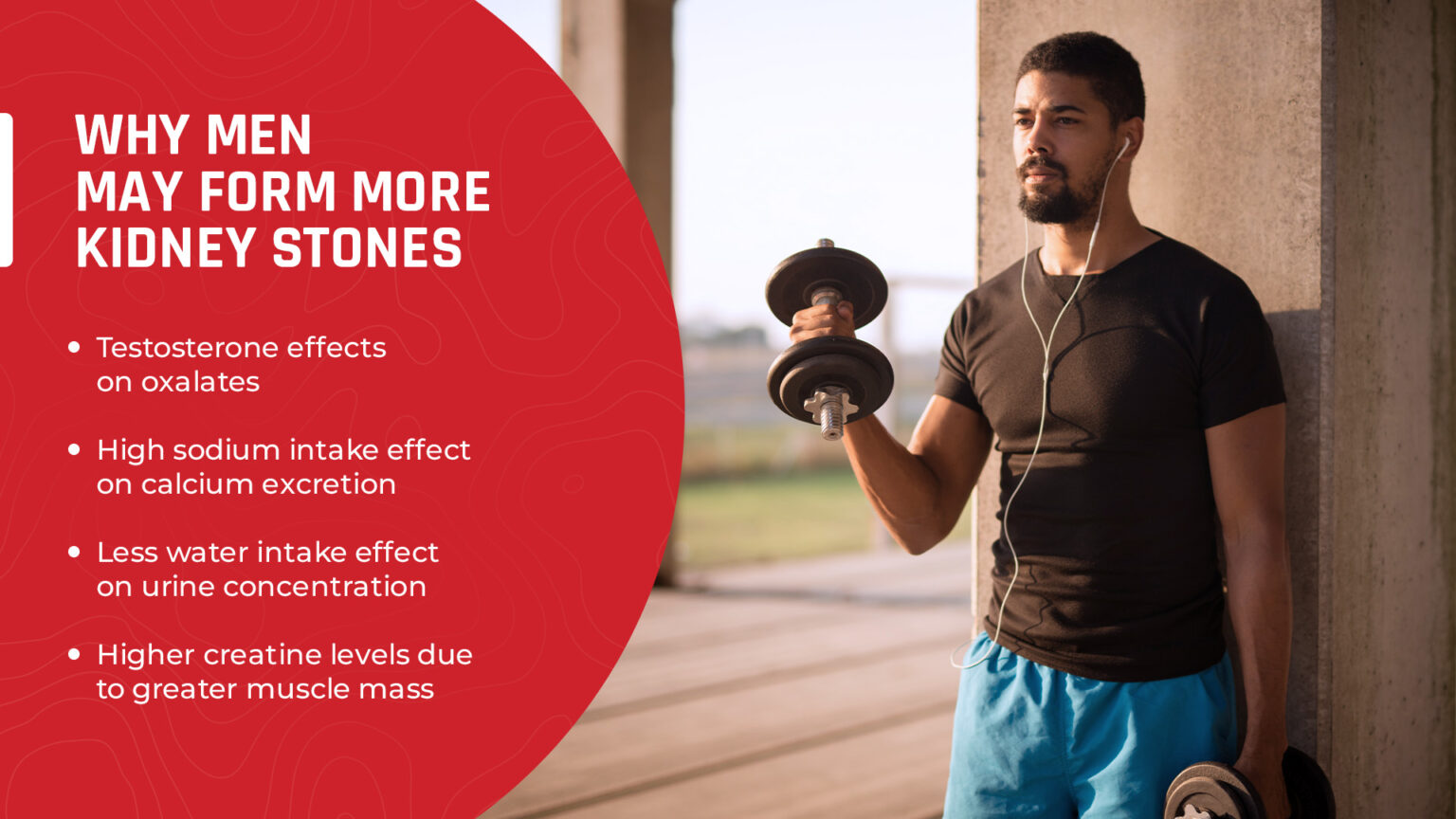Published: October 15, 2023 | 4 mins read
Why Men Form More Kidney Stones Than Women
According to studies, kidney stones are more common in males than females. In the United States alone, about 11% of men and 6% of women have kidney stones at least once in their lifetime. So, what’s leading to this gap?
This article aims to explain why males have a higher risk of developing kidney stones than females by exploring two risk factors.
SEX HORMONES IMPACT ON KIDNEY STONE RISK
Hormonal differences between men and women affect the four urinary factors related to kidney stones. These are:
- Calcium
- Magnesium
- Oxalate
- Uric acid
In men, higher testosterone levels play a role in the development of kidney stones. Testosterone impacts kidney stone formation because it increases glycolic acid oxidase (GAO), an enzyme in the liver. Higher levels of GAO can convert substances in the liver to oxalate. In fact, a study investigating the impact of dihydrotestosterone (a.k.a. DHT- a derivative of testosterone) over four weeks found a 12.8x increase in urinary oxalate excretion.
Testosterone also may reduce the effect of osteopontin. Osteopontin is a protein that prevents the crystallization of calcium phosphate and calcium oxalate in the kidneys.
For women, estrogen has the opposite effect of testosterone. Studies found that menopausal women with lower estrogen levels are more likely to develop kidney stones than premenopausal women. Low estrogen levels produce a similar effect to testosterone in men regarding kidney stone formation.
Women suffering from polycystic ovary syndrome (PCOS) also form kidney stones at an accelerated rate. This is because PCOS causes the ovaries to excrete an abnormal amount of male sex hormones. On the flip side of this, studies show that postmenopausal women with higher estradiol (another female hormone) levels may have a lower risk of forming kidney stones.
Nevertheless, more research is needed to prove the impact of sex hormones on kidney stone formation. There’s something wrong with the concept that healthy males with robust testosterone levels are at a higher risk for kidney stones. There has to be a missing component yet to be identified that may be influencing stone risk as it relates to testosterone if it relates at all.
URINARY CALCIUM EXCRETION DIFFERENCES
Daily calcium excretion in the urine is higher in men. One reason for this is higher sodium intake. Plus, there’s higher thirst threshold in men, due to a hormone called vasopressin (produced in the brain). Vasopressin triggers the kidney to reabsorb water back into the bloodstream. This results in more highly concentrated urine.
Men who suffer from kidney stones also have higher creatinine production than women. Creatinine is a waste product from the muscles in the blood that the kidneys filter, which affects the amount of calcium and magnesium found in the urine.
Normal urinary calcium levels should be ≤250 mg (6.25 mmol). Higher calcium values in the urine can mean an increased risk for calcium-oxalate stones if oxalates are present. Also, it may contribute to calcium-phosphate stones under alkaline urine pH (>7.5). However, increased calcium in the urine alone does not equate to a higher risk for kidney stones. There must be other contributing factors.

THE BOTTOM LINE
Our hormones may play a role in kidney stone formation related to calcium and oxalates in our urine. And it seems that men are disadvantaged based on research and statistics.
Because of this, it is more important than ever for men to pay attention to contributing factors such as oxalate and urine pH. If men completely DUMP dietary oxalate and carefully monitor their urine ph, they can decrease their risk for kidney stones. Remember, elevated calcium in your urine alone is not a risk factor.
If you want to take your kidney stone prevention to a higher level, we advise joining our Coaching Program. This will give you an opportunity to formulate a personalized prevention plan based on your specific situation.
REFERENCES
- Definition & Facts for Kidney Stones
- Active site and loop 4 movements within human glycolate oxidase: implications for substrate specificity and drug design
- Androgens Involvement in the Pathogenesis of Renal Stones Formation
- Osteopontin and Tamma-Horsefall proteins – Macromolecules of myriad values
- Possible role of elevated serum testosterone in pathogenesis of renal stone formation
- Effect of Demographics on Excretion of Key Urinary Factors Related to Kidney Stone Risk
- Hypercalciuria
- Health Encyclopedia – URMC

Comments or questions?
Responses
WHAT TO READ NEXT
Publish Date: August 11, 2024
Magnesium Benefits for Kidney Stone-Formers
Publish Date: July 14, 2024
Medicines That Can Cause Kidney Stones
Publish Date: April 7, 2024
Metabolic Syndrome and Insulin Resistance Impact on Kidney Stones